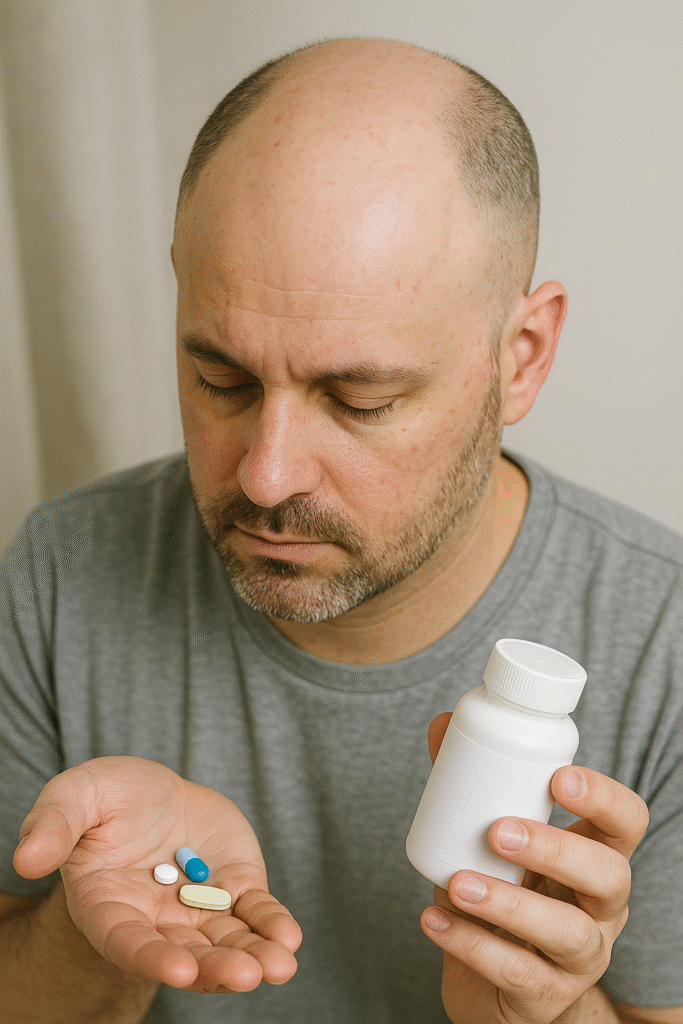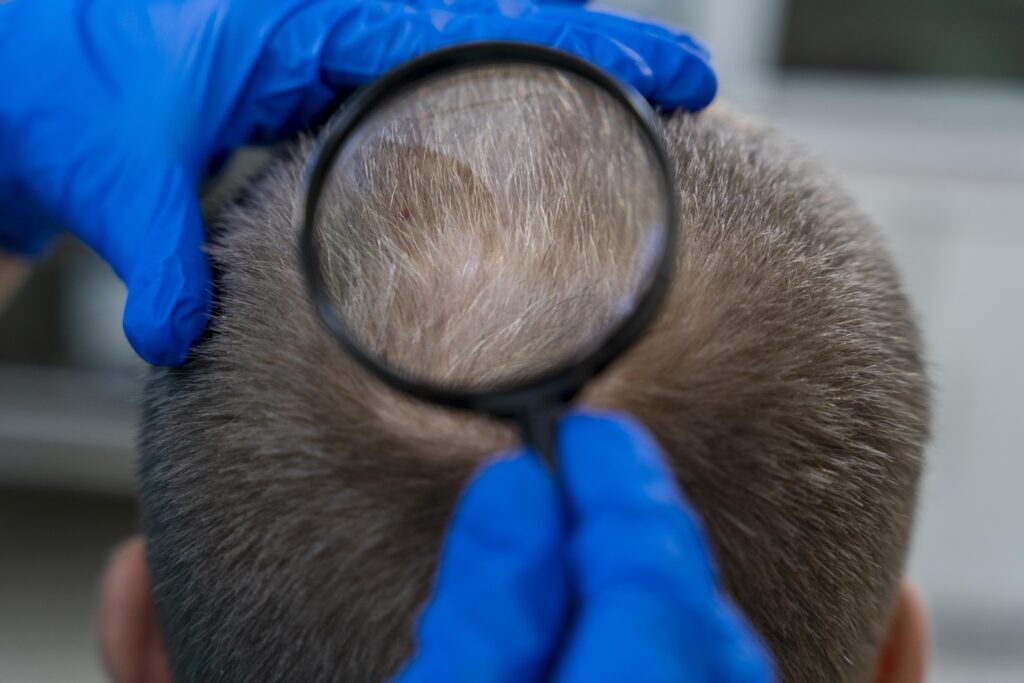Are you struggling with patchy hair loss and looking for real solutions? Alopecia areata drugs offer new hope for regrowing hair and managing symptoms of this autoimmune condition.
In this medically reviewed guide, you’ll discover FDA-approved treatments, off-label options, and expert tips to help you make informed decisions. Whether you’re newly diagnosed or seeking better results, this article will walk you through what works—based on science and clinical experience.

What Is Alopecia Areata?
Alopecia areata is an autoimmune disorder that causes sudden, unpredictable hair loss. The immune system mistakenly attacks hair follicles, leading to hair loss in small, round patches. It can affect the scalp, beard, eyebrows, and other parts of the body.
Causes and Symptoms
- Autoimmune dysfunction is the root cause, often triggered by stress, genetics, or environmental factors.
- Common symptoms include:
- Smooth, circular bald patches
- Tingling or itching in affected areas
- Nail pitting in some cases
How It Differs From Other Types of Hair Loss
- Alopecia Areata: Autoimmune-driven, patchy loss
- Androgenetic Alopecia: Hormonal and genetic, gradual thinning
- Telogen Effluvium: Stress-induced shedding
Understanding this distinction is crucial for proper treatment selection.

Treatment Overview: How Drugs Help Manage Alopecia Areata
Can Alopecia Areata Be Cured With Medication?
There is no permanent cure, but medications can control the immune response and stimulate regrowth. Treatment results vary based on severity, age, and response to drugs.
Goals of Drug-Based Therapy
- Reduce immune system attack on follicles
- Stimulate dormant follicles to restart hair growth
- Maintain regrowth and prevent relapse
- Improve quality of life and mental well-being
FDA-Approved Drugs for Alopecia Areata
Breakthroughs in immunology have led to targeted treatments, especially JAK inhibitors, which interrupt the inflammatory signals that damage hair follicles.
Baricitinib (Olumiant)
- How it works: Inhibits Janus kinase (JAK) pathways
- FDA Approval: 2022 for severe alopecia areata
- Benefits:
- Significant regrowth in over 30% of patients
- Oral tablet, easy compliance
- Side effects: Upper respiratory infections, headache, elevated cholesterol
Ritlecitinib (Litfulo)
- New FDA-approved JAK3/TEC inhibitor
- Approved in 2023 for patients aged 12+
- Results: Promising hair regrowth, especially in younger patients
- Tolerability: Fewer side effects compared to older JAK inhibitors
Differences Between Olumiant and Litfulo
| Drug | Target Enzyme | Age Group | Form | Approval Year |
|---|---|---|---|---|
| Olumiant | JAK1/JAK2 | 18+ | Oral | 2022 |
| Litfulo | JAK3/TEC | 12+ | Oral | 2023 |
Off-Label and Commonly Prescribed Medications
These treatments are not specifically approved for alopecia areata but are often used effectively by dermatologists.
Topical Corticosteroids
- Suppress inflammation at the follicle level
- Usually applied twice daily
- Mild to moderate effectiveness
Oral Corticosteroids
- Systemic immunosuppression for rapid hair regrowth
- Short-term use due to side effects: weight gain, hypertension, mood swings
Minoxidil (Topical)
- Popular over-the-counter solution
- Enhances blood flow to follicles
- Best as a combination therapy, not standalone
Anthralin Cream
- Synthetic tar-like compound
- Triggers irritation to modulate immune response
- Used under medical supervision
Immunotherapy Agents
- DPCP or Squaric Acid Dibutylester
- Applied to create a mild allergic reaction
- Helps “distract” immune system away from follicles
Methotrexate and Cyclosporine
- Immunosuppressants for severe or resistant cases
- Require close monitoring for liver and kidney function

Natural and Complementary Therapies
Can Natural Remedies Replace Drugs?
No natural remedy is a proven substitute for prescription medications, but they can support conventional treatment.
Supplements and Herbs Backed by Some Evidence
- Zinc and biotin: Support follicle health
- Saw palmetto: Anti-inflammatory effects
- Curcumin: May regulate immune function
Lifestyle Modifications That Support Medical Treatments
- Stress management (e.g., mindfulness, yoga)
- Anti-inflammatory diet (rich in omega-3s, antioxidants)
- Sleep hygiene and physical activity
How Long Do Alopecia Areata Drugs Take to Work?
Typical Timelines for Drug Response
- Topical steroids: 1–3 months
- JAK inhibitors: 3–6 months for visible regrowth
- Immunotherapy agents: May take 4–6 months
Signs of Regrowth and Effectiveness
- Fine, vellus hairs in bald patches
- Darkening and thickening over time
- Reduced patch expansion
When to Switch or Stop Medication
- No improvement after 6 months
- Severe side effects
- Treatment fatigue or resistance
Side Effects and Risks to Know Before Starting Treatment
Short-Term vs Long-Term Side Effects
| Treatment | Short-Term Side Effects | Long-Term Risks |
|---|---|---|
| Corticosteroids | Weight gain, insomnia | Bone loss, diabetes |
| JAK Inhibitors | Infections, headache | Liver damage, blood clots |
| Immunotherapy | Skin irritation | Persistent dermatitis |
Who Should Avoid Certain Medications?
- Pregnant or breastfeeding individuals
- People with active infections or immune disorders
- Children (except Litfulo under pediatric supervision)
Expert Insights on Managing Alopecia Areata With Medication
Dermatologist Tips for Drug Success
- Stick to prescribed dosage and timeline
- Don’t self-medicate or stop abruptly
- Monitor progress monthly with photos
Monitoring Progress and Adjusting Dosages
- Use hair density charts or apps
- Report side effects early
- Reassess every 12 weeks
When to See a Specialist
Who Should Consider Drug Therapy?
- New or worsening patches
- Extensive scalp or body hair loss
- Emotional distress due to appearance
- Poor response to natural/home remedies
Choosing a Certified Hair Restoration Specialist or Dermatologist
Always opt for board-certified dermatologists or hair restoration surgeons.
In Pakistan, Dr. Rana Irfan offers expert consultation for alopecia areata and other hair loss conditions.
FAQs About Alopecia Areata Drugs
What is the most effective drug for alopecia areata?
Currently, Olumiant and Litfulo are leading FDA-approved options with high success rates in clinical trials.
Are JAK inhibitors safe long term?
While effective, they require medical supervision due to risks like infections and elevated liver enzymes.
Can children take medication for alopecia areata?
Yes, Litfulo is approved for children 12 and older. Always consult a pediatric dermatologist.
Do hair regrowth drugs work for total hair loss?
Yes, especially JAK inhibitors have shown regrowth even in cases of alopecia totalis or universalis.
Is it necessary to take medications forever?
Not always. Some patients achieve stable regrowth and taper off under supervision. Relapses can happen.
Take Your Next Step
Ready to take control of your hair loss journey? Get expert guidance on which alopecia areata drugs are right for you. Dr. Rana Irfan and his team provide customized treatment plans based on medical history, severity, and goals.
